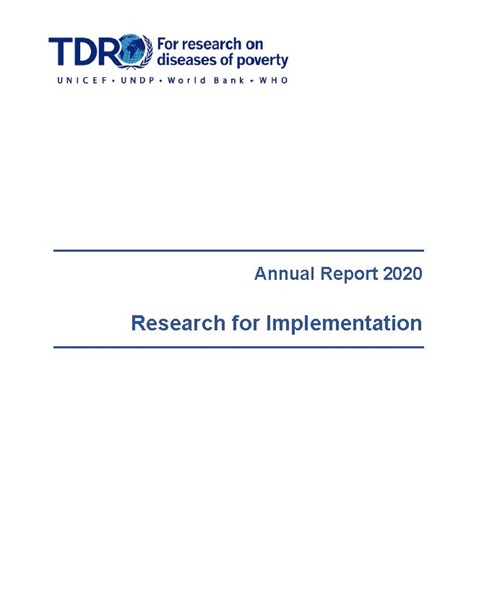Annual report 2020: Research for implementation

Overview
Research for Implementation is one of the three strategic priority areas of the UNICEF/UNDP/World Bank/WHO Special Programme for Research and Training in Tropical Diseases (TDR) within its 2018–2023 strategy. The supported research activities are contributing to achievement of the Sustainable Development Goals (SDGs) by 2030, specifically SDG 3 “Ensure healthy lives and promote wellbeing for all at all ages” and SDG 10 “Reduce inequalities within and among countries,” as well as supporting universal health coverage (UHC).
The Research for Implementation activities focus mainly (but not exclusively) on research leading to the development of policies and guidelines and their effective implementation in public health programmes. The activities are also producing the evidence needed to reduce the burden of infectious diseases of poverty in low- and middle-income countries (LMICs).
The Research for Implementation activities focus on finding new solutions to reduce the burden of infectious diseases of poverty and ensure access to health technologies for those in need.
Four main areas of activity are included within TDR’s current strategy:
1. RESEARCH FOR POLICIES: to understand and produce evidence on large-scale performance, acceptability, feasibility, implementation needs and potential impact of available tools as a basis for determining what tools are suitable for guidelines and policies.
2. RESEARCH FOR IMPLEMENTATION: to understand and address barriers to effective, quality and equitable implementation of health interventions, strategies, guidelines and policies to provide the evidence as to how these can best be implemented for maximum impact.
3. RESEARCH FOR INNOVATION: to provide directions for the development of improved and adapted new tools and strategies needed, and to promote their development and use.
4. RESEARCH FOR INTEGRATED APPROACHES: to understand the complex interactions between people and their environment that affect disease transmission.
The above-mentioned objectives are being implemented through 14 Expected Results (ERs) that have been developed in coordination with TDR’s Scientific Working Groups (SWGs).

